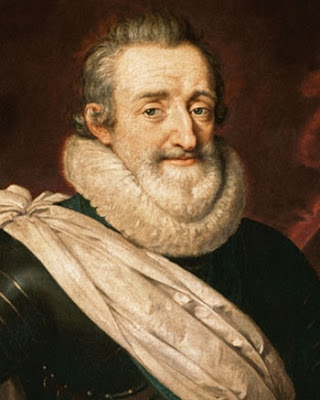The Powers that Be
HENRY IV
- Born December 13,1553, died May 14,1610
- Henry IV was the first King of France during the 17th Century, and was a powerful and heroic figure indeed. He was born Protestant, and was forced to fight a series of bitter civil wars with the hard-line Catholics of France for his crown.
Before he ascended to the throne in 1589, however, he became a Catholic, to assuage religious tensions. He continued, though, to have Protestant sympathies, and in 1598, he issued the Edict of Nantes, giving the Huguenots the right to worship as they wished, and protecting their rights under law. Most of the internal conflict subsided, also in 1598, and Henry IV led France into a period of prosperity and internal peace.
His powerful personality, leadership, and military ability made his country a political and military power in Europe. Henry IV was assassinated in 1610 by a Catholic fanatic.
 |
| Henry IV |
MARIE DE MEDICI
- Born April 26, 1576
- Marie de' Medici, originally a scion of the powerful and rich ‘House of Medici’, was the Queen of France and the second wife of the King of France, Henry IV.
After King Henry IV was assassinated she was made the regent for her son Louis by the Parliament of Paris until the time he came of age. She was guided by Concino Concini in reversing the anti-Spanish policy implemented by King Henry IV. She, along with Concino, continued to govern ignoring and using the name of King Louis XIII even after he came of age.
She had strained relation with her son King Louis XIII for her endless political affiliations and even faced exile. She is noted for her remarkable artistic patronage, lavish and capacious building constructions that till date rank among some of the finest works in Paris.
 |
| Marie de Medici |
LOUIS Xlll
- Born September 27, 1601
- King Louis Xlll was in many ways a bland and timid man, and although France advanced to greatness during his rule, this was chiefly due to his dependency on Richelieu, and his willingness to pass all matters of state over to the Cardinal. His father, Henry IV, was assassinated in 1610, and he became King at age 9. His mother, however ruled for him until 1614, and continued to dominate the government, with her favourite from her home of Florence, Concino Concini, until 1617.
Louis, finally, took on an advisor of his own, Charles d'Albert, who had Concini assassinated, and Marie de Medici's exiled to Blois with her first minister, Richelieu. This was the start of Louis' bad relations with his Italian Queen Mother. Before she was exiled, however, Marie managed to wed Louis to Anne of Austria, the proud young daughter of King Phillip I l l of Spain. This was a match which was never very popular with Louis himself.
While Marie was away from court, she attempted to incite two unsuccessful rebellions. Finally, in 1620, Richelieu brought Marie back to court, and reconciled mother and son, or, at least, established an uneasy truce. In 1621, Louis' favourite advisor, d'Albert, died, and he began to rely on Richelieu, although he still distrusted him. When the Huguenot uprisings took place, Louis fought in several battles, and with Richelieu's aid, established a strong France internally.
Wars continued, but Louis was a victim to ill health and depression, and Richelieu increased his hold on the government.
 |
| Louis XIII |
QUEEN ANNE
- Born 22 September 1601
- In November 1615, Anne and Louis were married. They were both 14 years old.
Louis's mother, Marie de' Medici, continued to be the Queen of France. She did not discuss things with her daughter-in-law. Anne, with her Spanish ladies-in-waiting, continued to live according to Spanish custom. She failed to improve her French.
The duc de Luynes tried to make the queen and king closer. He sent away the Spanish ladies and hired French ones instead. He also organised court events that would bring the queen and king together more happily.
However, a number of 'wretched miscarriages' again made their relations cold. Louis angrily blamed her. Anne remained without a child for 16 more years.
Through his life Louis had a cool behaviour towards Anne. He was always fearful that his wife "had a great passion for the interests of Spain". In 1625 the English George Villiers, 1st Duke of Buckingham, shocked the French court by admitting his passion for Anne.
 |
| Anne of Austria |





No comments:
Post a Comment